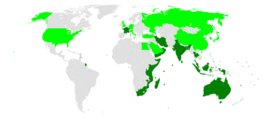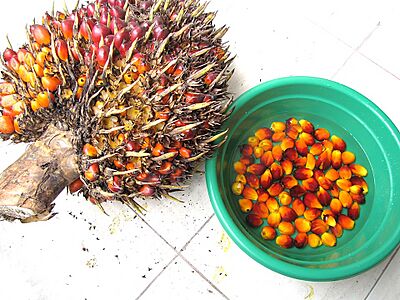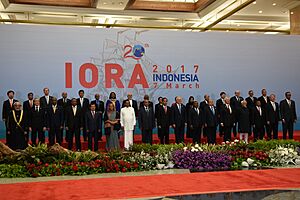Indian Ocean Rim Association facts for kids
Quick facts for kids
Indian Ocean Rim Association
|
|
|---|---|

IORA members Dialogue partners
|
|
| Headquarters | Ebene, Mauritius |
| Working languages | |
| Type | Intergovernmental |
| Membership |
23 members:
12 dialogue partners:
|
| Leaders | |
|
• Secretary General
|
Sanjiv Ranjan, Secretary General |
|
• Chair
|
|
|
• Vice Chair
|
|
| Establishment | |
|
• 6 March 1997
|
Indian Ocean Rim Association for Regional Co-operation |
| Time zone | UTC+2 to +10.5 |
The Indian Ocean Rim Association (IORA) is an international group. It includes 23 countries that are located around the Indian Ocean. IORA helps these countries work together. They focus on things like trade, business, and social development. The main office for IORA is in Ebene, Mauritius.
Contents
What is IORA?
IORA started as an idea in 1995 in Mauritius. It officially launched on March 6–7, 1997. This happened when countries signed a special agreement. The idea for IORA came from leaders like Nelson Mandela of South Africa.
At first, only a few countries were involved. These included South Africa, India, Mauritius, and Australia. Later, more countries joined. These were Indonesia, Sri Lanka, Malaysia, Yemen, Tanzania, Madagascar, and Mozambique.
The main group that makes decisions for IORA is called the Council of (Foreign) Ministers. Before they meet, other groups also have meetings. These include groups for academics, businesses, and trade.
Why IORA is Important
IORA has several important goals. They want to help the region grow in a fair way. They also want to make it easier for countries to trade with each other. This includes sharing goods, services, money, and new technologies.
IORA focuses on six main areas. These are:
- maritime security (keeping the ocean safe)
- making trade and investment easier
- managing fisheries (making sure there are enough fish)
- reducing risks from disasters
- working together in science and learning
- promoting tourism and cultural exchanges
They also have two special focus areas. These are the Blue Economy and Women's Economic Empowerment. The Blue Economy is about using ocean resources in a smart way. Women's Economic Empowerment helps women in business.
IORA countries work on many projects together. These include making trade easier and helping foreign businesses invest. They also work on sharing science and technology. Other areas are tourism, helping people move for work, and building better infrastructure. They also focus on reducing poverty and protecting the environment.
Main Focus Areas
Since 2011, IORA has focused on six main areas. They also have two special focus areas. This helps them become stronger as an organization.
Keeping Oceans Safe
IORA sees itself as a key group for ocean safety. This includes many things. It means protecting the ocean environment. It also means dealing with threats like illegal fishing. IORA also works on "maritime safety." This involves training, safe transport, and helping ships in trouble.
Making Trade Easier
The Indian Ocean is very important for global trade. IORA wants to make it simpler for countries to trade. This means reducing problems for goods, services, money, and technology. Their plan for 2017-2021 had goals. These included making trade barriers lower. They also wanted to make business travel easier.
Managing Fisheries
Managing fisheries is a very important issue for IORA. It's so important that it's a top priority. IORA has a special group called the Fisheries Support Unit (FSU). This group helps promote sustainable fishing. They want to reduce overfishing. They also want to make sure seafood trade is safe and responsible.
Dealing with Disasters
The Indian Ocean region often faces natural disasters. These include cyclones, earthquakes, and tsunamis. There are also man-made disasters like oil spills. IORA works on managing these risks. They help countries prepare for disasters. They also help them respond and recover. IORA's plan involves governments, aid groups, and businesses.
Tourism and Culture
IORA encourages tourism and cultural sharing. They suggest ways for member countries to work together. This helps boost the economy in the region. It also promotes eco-tourism, which is good for nature. They also want to celebrate and use the economic potential of cultural heritage.
Science and Technology
IORA supports cooperation among top research centers. They believe that academics can help IORA learn more. This includes important topics like protecting the ocean.
Big Steps and Successes
Growing Bigger
More Members
When IORA first started, it had only seven countries. By March 1997, it grew to 14. Now, IORA has 23 member countries. It also has 12 "dialogue partners." China became a dialogue partner in 2001. This growth means IORA truly represents the Indian Ocean region. Having big countries as partners also makes IORA more influential.
Wider Focus
At first, IORA only focused on money and trade. But it has grown to include wider goals. These include keeping the ocean safe in new ways. This is important because new kinds of threats are appearing in the ocean.
Blue Economy
The "Blue Economy" is a special focus area for IORA. All IORA countries started paying attention to it in 2014. This is because it can create jobs and help feed people. It also helps reduce poverty. The Blue Economy encourages new business ideas. It helps both large and small economies in the region.
Australia and India are leading the way in this area. They have clear plans for the Blue Economy. IORA has helped set up ways to work together on eco-tourism. They also created the Indian Ocean Tuna Commission. This group helps manage tuna fishing in the Indian Ocean. They also research ocean resources for medicine. These are examples of how Blue Economy ideas are working through IORA.
Challenges IORA Faces
Even though IORA has many members and is growing, it faces challenges. These problems can stop it from becoming a very strong group. Some issues are about how the group is set up. Others are about conflicts between countries.
Different Countries, Different Goals
IORA has many members. This helps it understand different viewpoints. But it also means countries have different goals. They might disagree on what successful ocean safety looks like.
IORA includes some of the world's richest countries. These are the United Arab Emirates, Singapore, and Australia. It also includes some of the poorest, like Mozambique. This can lead to different benefits from IORA projects. It can also cause competition between members.
Other Groups in the Region
IORA also competes with other groups. Many IORA members also belong to other regional organizations. This means their attention and money are split.
Country Conflicts
Conflicts between countries have made IORA's work harder. For example, India has not allowed Pakistan to join IORA. This conflict has affected IORA.
Also, China has become more involved in the Indian Ocean. This is especially true with its Belt and Road Initiative. India sees this as a way for China to gain more power. This creates distrust, even though China is a dialogue partner. Experts say China's involvement could help IORA. This is especially true for the Blue Economy. But India often pushes back against it.
Who are the Members?
IORA has 23 member countries. It also has 12 dialogue partners. Two other groups, the Indian Ocean Tourism Organisation and the Indian Ocean Research Group, are observers.
Dialogue Partners
These countries and groups are dialogue partners:
IORA Summits
IORA holds summits where leaders meet.
| Year | # | Dates | Country | City |
|---|---|---|---|---|
| 2017 | 1st | 5–7 March | Jakarta |
Special Projects
In 2004, a special fund was created. This fund helps pay for projects that support IORA's goals.
Fisheries Support Unit (FSU)
The Fisheries Support Unit started in late 2011. Its main office is in Muscat, Oman. The FSU helps countries work together on fisheries. It also does research to protect fish. The FSU mainly shares information and ideas. It does not make rules about fishing.
Science and Technology Center
The IORA Regional Center for Science and Technology Transfer (IORA RCSTT) started in 2008. It is based in Tehran, Iran. This center uses its resources for many issues. These include responding to disasters. It also works on creating a database for medicinal plants.
Indian Ocean Dialogue (IOD)
The IOD started in 2013. It is a special discussion forum. It brings together experts and leaders from member countries. They talk about important topics affecting the Indian Ocean region.
Sustainable Development Program
The IORA Sustainable Development Program (ISDP) began in 2014. It helps the less developed countries in IORA. It shares the best ways to use the Blue Economy. This helps bridge the gap between richer and poorer member states. Like other IORA projects, it focuses on sharing information and learning from each other.
See Also
- International Conference on Indian Ocean Studies
- Indian Ocean Commission
- Indian Ocean trade
- Asia-Pacific Economic Cooperation
- Global Southeast
- Organisation of American States
- Organisation of the Black Sea Economic Cooperation
- Union for the Mediterranean
 | Precious Adams |
 | Lauren Anderson |
 | Janet Collins |




